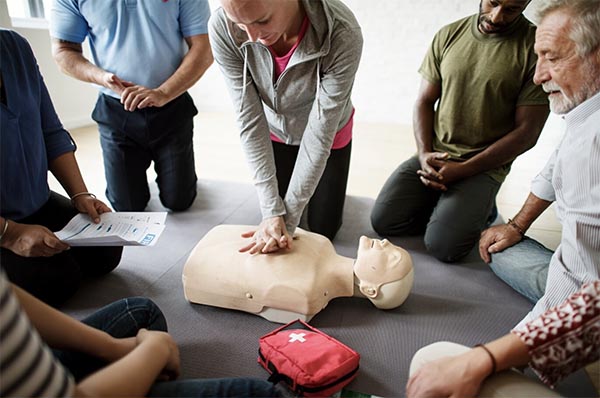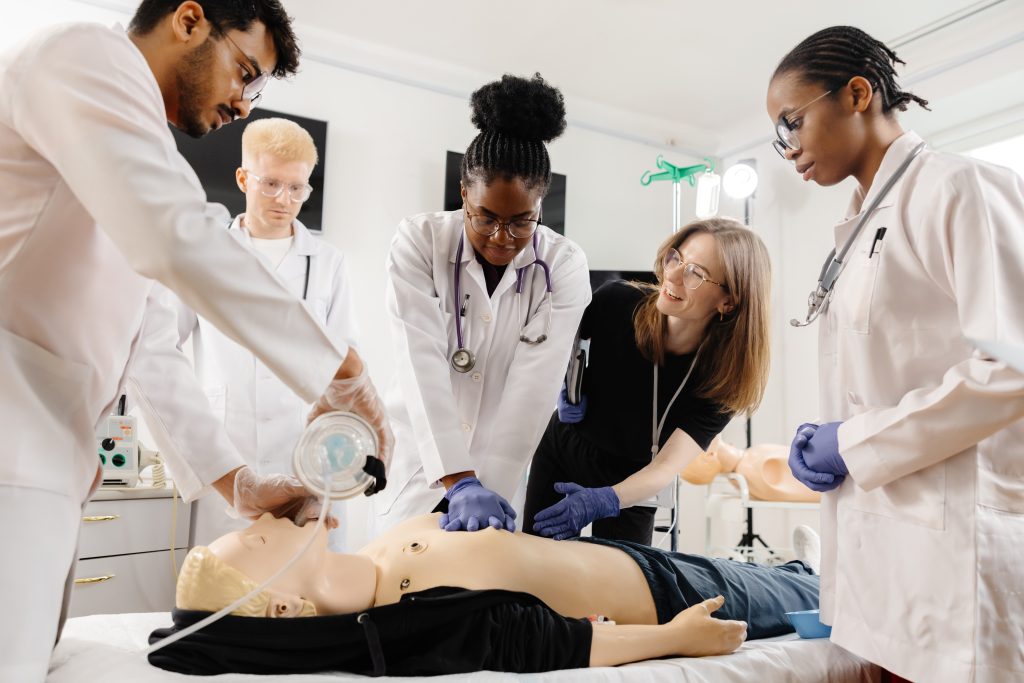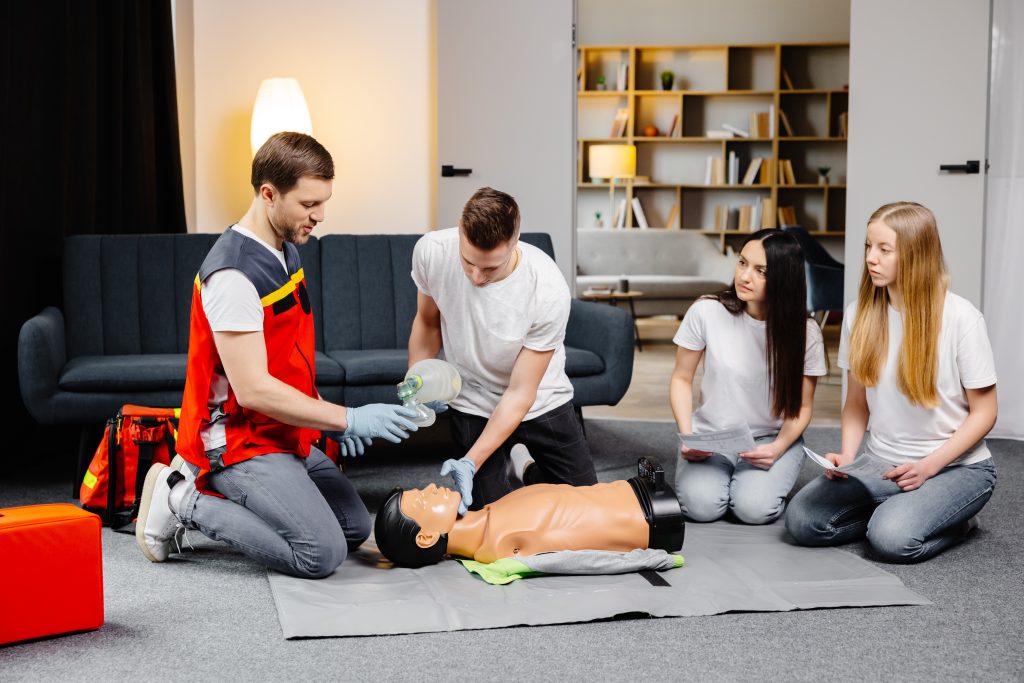
Welcome to Raleigh, North Carolina, a thriving city where professional opportunities abound, especially in critical fields like healthcare, education, and childcare. Landing or maintaining a job in these demanding sectors often requires a current, recognized CPR certification. However, as you begin your search for “CPR certification near me,” you will quickly encounter two giants in the field: the American Heart Association (AHA) and the American Red Cross (ARC).
For professionals in the Triangle area, this choice is not merely a preference; it is a critical career decision. While both organizations teach the life-saving skills of cardiopulmonary resuscitation, their certifications possess distinct attributes regarding industry acceptance, course depth, and overall rigor. Choosing the correct credential ensures you satisfy your Raleigh employer’s specific requirements without wasting time or money on a course they won’t recognize.
This comprehensive guide will dissect the differences between the AHA and the Red Cross. We will provide you with the essential, factual information needed to make the smartest choice for your career goals right here in Raleigh, NC. We are focused on providing content that is easy for humans to read and for search engines to process, using clear, concise language and structured formatting. Let’s find out exactly which CPR certification is the gold standard for your specific job.
What Are the Core Standards That Both AHA and Red Cross Certifications Follow?
Despite the perceived rivalry, both the American Heart Association (AHA) and the American Red Cross (ARC) follow the same foundational scientific guidelines for resuscitation. This shared scientific basis is the most important similarity between the two organizations.
The Unifying Scientific Principle
- The core standards for CPR, AED use, and emergency cardiovascular care are set every five years by the International Liaison Committee on Resuscitation (ILCOR).
- The AHA is the primary research body that translates these international recommendations into the official, evidence-based CPR guidelines used across the United States.
- The Red Cross, and every other legitimate training provider, bases their curriculum and techniques on these latest AHA guidelines.
- This means the life-saving skills taught in both courses are scientifically identical.
Standardized Techniques
When an instructor is teaching in a Raleigh classroom, whether AHA or Red Cross affiliated, the core techniques they teach are consistent.
- Compression Rate: Both courses require performing chest compressions at a rate of 100 to 120 beats per minute. This rate maximizes blood flow to the brain and vital organs.
- Compression Depth: In adults, both standards mandate compressions be at least two inches deep. Consistency in depth is crucial for effective circulation.
- C-A-B Sequence: The modern standard, adopted by both, prioritizes the Compressions, then Airway, then Breathing sequence (C-A-B).
Because the life-saving skills are scientifically consistent, the main differences truly lie in the structure, rigor, and industry acceptance of the final card. When you choose a certified provider like CPR Classes Near Me, you are learning techniques that adhere to the highest global standards. This consistency means any certified rescuer in Raleigh will perform CPR the same way in an emergency, regardless of their card’s logo.

Is AHA Certification Truly the Gold Standard for Raleigh’s Healthcare Sector?
Yes, the American Heart Association (AHA) certification, particularly the Basic Life Support (BLS) credential, is overwhelmingly considered the gold standard and is often the mandatory requirement for healthcare professionals across Raleigh, NC. This preference is deeply rooted in the AHA’s specific focus and its research-driven curriculum.
Why Healthcare Employers Demand AHA
The AHA is more than a trainer; it is the primary research body that generates the evidence underpinning resuscitation science. Hospitals and clinical settings favor AHA because their material is updated immediately based on their own cutting-edge findings.
- BLS Focus: The AHA’s BLS Provider course is specifically designed for professionals working in medical environments.
- It covers critical topics beyond basic CPR that are essential for clinical teams.
- Team Dynamics: BLS training emphasizes team-based resuscitation scenarios, vital for effective emergency response in a hospital or ambulance setting.
- The curriculum teaches advanced concepts like using a Bag-Valve Mask (BVM) and specialized roles during a code.
- Advanced Pathway: For doctors and specialized nurses, AHA offers required higher-level certifications such as Advanced Cardiovascular Life Support (ACLS) and Pediatric Advanced Life Support (PALS).
- These advanced courses build directly upon the foundation established in the AHA BLS course, creating a seamless professional training continuum.
Key Raleigh Healthcare Roles Requiring AHA BLS
If your job involves direct patient care in a Raleigh medical facility, expect the AHA BLS certification to be required.
- Registered Nurses (RNs) and Licensed Practical Nurses (LPNs): Mandatory for employment and licensing renewal in most NC facilities.
- Certified Nursing Assistants (CNAs): Essential for roles in hospitals, nursing homes, and home health agencies.
- Emergency Medical Technicians (EMTs) and Paramedics: AHA BLS is the foundational requirement before moving on to ACLS/PALS.
- Medical Assistants and Dental Office Staff: Many private practices and clinics in Raleigh prefer or require AHA BLS to ensure standardized clinical readiness.
- Physical Therapists and Occupational Therapists: These professionals often interact with patients who have cardiac risks, making AHA certification crucial.
For those pursuing a medical career path in Raleigh, AHA BLS is not just a suggestion; it is a professional prerequisite. Organizations like CPR Classes Near Me focus on delivering this exact American Heart Association-certified training to prepare individuals for the demands of the Triangle healthcare industry.
When is Red Cross Certification an Acceptable or Preferred Choice in Raleigh?
While the AHA dominates the clinical healthcare space, the American Red Cross (ARC) certification is widely accepted and often preferred in non-clinical, community, and general workplace settings throughout Raleigh. The ARC excels at providing accessible, practical training focused on building confidence in lay responders.
Red Cross Acceptance in Non-Clinical Settings
The ARC’s training programs, often titled “CPR/AED for Community and Workplace” or similar, are specifically tailored for individuals who are likely to be bystanders or first responders in low-risk environments.
- Workplace Requirement: Employers in general offices, construction, or manufacturing who require basic emergency preparedness will readily accept ARC certifications.
- OSHA guidelines in North Carolina frequently recognize both organizations as compliant.
- Focus on Confidence: The Red Cross curriculum often utilizes more role-playing and interactive visual aids, concentrating on practical application and building the student’s confidence to act decisively.
- Their approach is designed to be highly user-friendly and approachable for non-medical participants.
Key Raleigh Non-Clinical Roles Where ARC is Accepted
If your job is outside of a hospital or clinic setting, the ARC certification is generally recognized as sufficient by these employers in Raleigh:
- Teachers and Educators: Public and private schools often accept ARC certification for teachers, administrators, and general staff, as they prioritize immediate response in a school environment.
- Childcare and Daycare Providers: Many North Carolina state safety and health regulations require childcare employees to maintain certification, often accepting either AHA or ARC.
- Coaches and Athletic Trainers: Coaches for youth sports leagues or high school teams typically require a certification that focuses on practical readiness for sudden incidents on the field or court.
- Fitness Professionals: Personal trainers, gym instructors, and yoga studio staff need CPR/AED certification, and ARC is a common, acceptable standard in these settings.
- Hospitality and Service Staff: Flight attendants, hotel staff, and event venue employees may be required to have certification, for which the ARC is highly recognized.
The ideal choice depends entirely on your specific employer’s policy. If your Raleigh employer specifically lists “AHA BLS only,” you must take the AHA course. If they state “Nationally recognized CPR certification required,” the Red Cross credential is usually a perfectly viable, and sometimes more practical, option.
How Do the Course Duration, Difficulty, and Costs Compare Between Providers?
When deciding between the American Heart Association (AHA) and the American Red Cross (ARC), three pragmatic factors, duration, difficulty, and cost, can help finalize your decision. These factors directly impact your time commitment and budget in Raleigh.
Certification Validity and Renewal Duration
The lifespan of your certification card is a major differentiator that affects how often you need to dedicate time and money to renewal.
- AHA Certification Validity: All AHA certifications, including BLS and Heartsaver, are universally valid for two years. This consistent renewal period makes planning easier for professionals and ensures adherence to current scientific guidelines.
- Red Cross Certification Validity: The Red Cross offers certifications that can be valid for one or two years, depending on the specific course level. The professional-level courses are typically valid for two years, but some layperson or community courses may only last for one year, requiring more frequent renewal efforts.
Course Difficulty and Rigor
While both organizations follow the same science, the style of instruction and the level of required mastery differ notably, impacting the perceived difficulty. The AHA’s training is often viewed as more challenging due to its emphasis on precision and clinical detail.
- AHA’s High Standards: The AHA requires a minimum passing score of 84% or higher on its written exams for BLS. This higher threshold reflects the expectation of precision and in-depth knowledge necessary for clinical environments.
- The AHA skills assessment often requires flawless performance and strict adherence to compression depth and rate metrics during team-based scenarios. Their focus is on evidence-based decision-making.
- Red Cross’s Practical Focus: The Red Cross typically requires a passing score of 80% or higher on its written exams. This slightly lower standard is intentional, aiming for broader accessibility and helping ensure that laypersons gain the essential life-saving skills.
- The Red Cross emphasizes competence and the ability to perform skills effectively in realistic, simulated situations for general emergency response.
Comparative Course Costs
Pricing will vary by the authorized training center and location in Raleigh, but a general cost comparison shows differences in structure. CPR Classes Near Me, an AHA provider, offers transparent local pricing.
- AHA Course Costs: Costs often range from $50 to $200 for courses like BLS. While the AHA may sometimes structure courses with separate online and in-person fees, many certified training sites like ours offer a simplified, bundled price.
- Red Cross Course Costs: Courses typically fall between $70 and $150. ARC often presents an upfront price that includes the certification card and necessary materials, sometimes making the initial cost structure appear simpler.
When evaluating costs, professionals in Raleigh must consider the return on investment. Paying slightly more for the universally accepted AHA BLS course is often worthwhile if it ensures compliance across multiple potential employers in the healthcare sector.

How Can I Ensure My Certification Will Be Accepted By My Raleigh Employer?
In Raleigh, the simplest way to guarantee acceptance is to ask your employer directly. This proactive step eliminates guesswork and ensures you enroll in the correct class the first time.
The Single Most Important Step
- Check the Requirement: Before registering for any class, ask your manager, HR department, or school administrator this exact question: “Does my job require a Basic Life Support (BLS) certification, and if so, must it be issued by the American Heart Association (AHA)?”
- The Specificity Trap: Many non-clinical jobs only require “CPR/AED” certification, where both AHA Heartsaver and Red Cross are fine. Healthcare jobs, however, almost always mandate the AHA BLS Provider course.
The AHA Advantage in Raleigh
Since CPR Classes Near Me Raleigh is an American Heart Association Certified Training Site, choosing our courses provides the highest level of assurance.
- Guaranteed Acceptance: The AHA BLS card is the most recognized and employer-preferred certification nationwide, including by every major hospital system and medical group in the Raleigh-Durham area.
- AHA eCard: Upon successful completion, you receive an official AHA eCard (electronic card) on the same day. This digital card proves your certification is authentic, recognized, and easily verifiable by any employer immediately.
- Local and Certified: Training with a certified local provider ensures the instructor, the equipment, and the curriculum are all compliant with the strict standards set by the AHA, removing all doubt about the card’s legitimacy.
Conclusion: Making the Right CPR Choice for Your Raleigh Career
Choosing the right CPR certification in Raleigh, NC, is less about which organization is “better” and more about which organization aligns with your professional aspirations. The answer comes down to whether you are pursuing a clinical or non-clinical career path.
The Bottom Line:
- If you are a Healthcare Professional (or aspiring to be one): The clear choice is the American Heart Association (AHA) Basic Life Support (BLS) Certification. This is the non-negotiable standard required by hospitals, clinics, and medical schools throughout the Triangle region.
- If you are a Non-Clinical Professional: Both the AHA Heartsaver and the Red Cross certifications are likely acceptable for roles in schools, gyms, or corporate offices. However, always verify with your employer first.
By understanding the differences in rigor, recognition, and duration, you can confidently enroll in the course that best serves your needs. Do not risk delaying your employment or renewal because of an incompatible certification card.
To secure the most universally recognized and employer-preferred certification, the AHA BLS Provider course, contact the experts at CPR Classes Near Me Raleigh today. Get your official, same-day AHA eCard and step into your career with guaranteed compliance.
Ready to get certified or renew your AHA BLS certification today? Contact CPR Classes Near Me Raleigh today to book your class and save your spot.
AHA vs Red Cross CPR in Raleigh: Frequently Asked Questions (FAQ)
Is a Red Cross CPR certification valid in North Carolina hospitals?
While the Red Cross offers a Professional Rescuer course, most North Carolina hospitals and major medical institutions only accept the American Heart Association (AHA) Basic Life Support (BLS) certification for clinical staff. The AHA BLS is mandatory because its curriculum is specifically geared toward team-based, clinical resuscitation protocols required in a medical environment. If you work in a hospital in Raleigh, you must choose AHA BLS.
What is the difference between CPR and BLS certification?
The difference lies in the target audience and curriculum depth. CPR (Cardiopulmonary Resuscitation) classes (like AHA Heartsaver) are designed for lay rescuers, focusing on basic life-saving skills for single-person emergencies. BLS (Basic Life Support) is a higher-level course explicitly designed for healthcare providers and professional rescuers. BLS includes CPR skills but adds advanced concepts like using barrier devices, performing two-rescuer team CPR, and complex choking protocols suitable for clinical settings. For any medical job in Raleigh, BLS is the required standard.
How long does my CPR certification last, regardless of the provider?
Most professional-level CPR certifications from both the American Heart Association (AHA BLS) and the American Red Cross are valid for a period of two years. The two-year period ensures that certified individuals are retrained and updated on any new scientific guidelines published by the American Heart Association or ILCOR. You must typically renew your certification before the expiration date to maintain active status with your Raleigh employer.
Can I take my CPR certification entirely online in Raleigh?
No, the vast majority of employers, especially those in the Raleigh healthcare and childcare sectors, will not accept a 100% online CPR certification. Both the AHA and the Red Cross require a blended learning approach, which combines an online cognitive portion with a mandatory, hands-on, in-person skills session. This required skills session, typically conducted by a certified instructor on mannequins, is essential to prove physical competence in compressions and ventilation. This hands-on practice is non-negotiable for obtaining a valid, employer-accepted card.
If I work in a school in Raleigh, do I need AHA or Red Cross?
If you work in a K-12 school or university in Raleigh, either certification is often acceptable, as long as it is a recognized provider. Schools typically accept the community or workplace level certifications from the Red Cross or the AHA Heartsaver courses. However, due to its widespread and preferred acceptance across all industries, choosing the AHA Heartsaver or BLS certification provides you with maximum career flexibility. Always confirm the specific acceptance policy with your school’s human resources department.

Leave a Reply